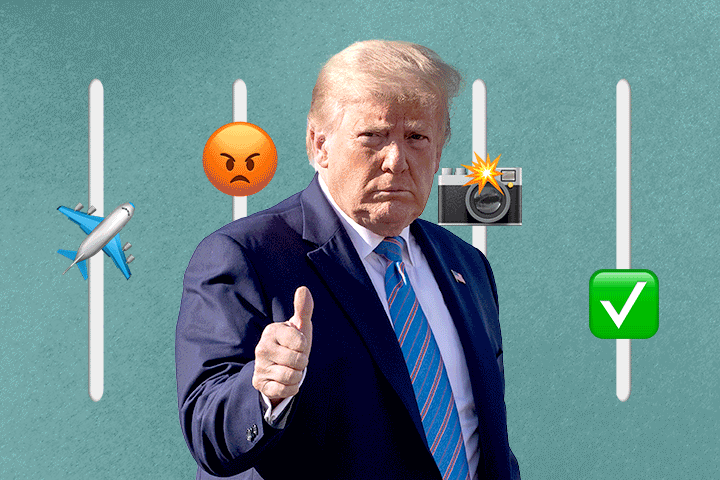Look to authoritarian parties abroad to see where the GOP is headed

- Share via
At critical junctures in their histories, political parties reassess their platforms, methods and the qualities and values they desire their politicians to embody. The Jan. 6 coup attempt that intended to keep President Trump in office illegally was such a moment for the GOP, which ever since has been remaking itself into an illiberal entity with dizzying speed.
The Republican Party is expunging the remaining democratic elements from its cadres and political culture with great vigor. It is embracing home-grown extremists, forcing out moderates, threatening dissenters and aligning itself with foreign autocrats like Hungary’s Viktor Orban.
Democratic frameworks are of little use to explain this tragic trajectory, or why the GOP has supported Donald Trump through two impeachments, a conspiracy to overturn the 2020 election, the Jan. 6 attack on the Capitol and now possible violations of the Espionage Act.
FBI removed classified documents from Mar-a-Lago, is investigating possible Espionage Act violations
The FBI obtained in Monday’s search of Trump’s home several types of classified and top secret documents.
We must look to authoritarian party dynamics as they have unfolded around the world to understand the Republicans’ journey out of democracy.
In autocracies, ruling parties become personal tools of the leader, and loyalty to the head of state, rather than expertise, is the most prized political quality. Those loyalty demands surge when the leader faces legal challenges or threats to his power. After the 2016 failed military coup against him, Turkish President Recep Tayyip Erdogan didn’t just purge the armed forces, he also forced the resignations of six mayors, all of whom were prominent members of his Justice and Development Party, or AKP.
Even in democratic contexts, when an autocratic-minded leader is under investigation, loyalty becomes paramount and the party’s time and resources are channeled into defending him. Party functionaries portray the leader as a victim of a “witch hunt” and smear journalists, prosecutors and judges, as Silvio Berlusconi’s Forza Italia party did with regularity during the former Italian prime minister’s many corruption trials, and as the GOP did during Trump’s two impeachment trials.
The “Big Lie,” which claims that Trump and not Joe Biden won the 2020 election, is an outgrowth of these authoritarian party dynamics. Institutionalized as GOP dogma, the Big Lie is now a “party line” that politicians must espouse to gain endorsements as candidates or to remain in good standing.
Former President Trump uses primary endorsements to seek revenge, push election fraud lies and shape the Republican Party. How are his candidates faring?
The most ambitious Republican politicians made themselves bearers of the Big Lie early on. In November 2020, Florida Gov. Ron DeSantis declared proudly that his state had no electoral fraud. Just one year later, he announced the formation of an Office of Election Crimes and Security and has already arrested 20 people.
The Big Lie has traction because it lets any GOP politician become a mini-Trump, denying certified election results to get to power or to try to stay there illegally. No wonder election deniers now make up nearly two-thirds of Republican candidates for state and federal jobs that have authority over voting contests.
Autocrats have long encouraged the lawless and the corrupt to populate party and state institutions. Twentieth century Italian dictator Benito Mussolini’s Cabinet and his Fascist Party bureaucracy were full of former Blackshirts who had killed liberals and leftists. Forza Italia politician Marcello Dell’Utri, who was Berlusconi’s right-hand man, was convicted of Mafia association in 2004 but stayed a senator. In 2019, national legislators in Prime Minister Narendra Modi’s India included 11 individuals who were involved in murder cases and an additional 10 who had been convicted of serious crimes.
A similar frightening dynamic is now developing in America as the GOP cultivates politicians with the right credentials for illiberal governance.
Republican campaign ads and speeches feature party hopefuls wielding shotguns or assault rifles and spouting fiery rhetoric. In the cases of Dr. Mehmet Oz, in Pennsylvania, and J.R. Majewski, in Ohio, such ads helped earn them primary victories.
Get ready to hold your nose: Hungary’s Orban, new darling of the American right, brings his Christian nationalist poison to Texas.
Local and state GOP politicians have long had ties with extremist groups. In Colorado, Oregon and other states, Republican officials have used members of militia groups as security for public events. Now these extremists increasingly are the party officials. A 2022 study counted 1 in 5 GOP state and local officials affiliated with groups such as the Oath Keepers.
For Arizona state Rep. Mark Finchem, publicizing membership in the Oath Keepers paid off: He will be the GOP candidate for secretary of state in Arizona in November. In Florida, Proud Boys members now hold seats on the Miami-Dade Republican Executive Committee. And dozens of individuals linked to Trump’s rally on Jan. 6 or the ensuing breach of the Capitol felt empowered to run for office, some with Trump’s endorsement.
Once unleashed, such lawless energies can be hard to tame, which is why so many authoritarian parties end up eating their own, their ranks devastated through periodic purges. The GOP is in such a phase now. Wyoming Rep. Liz Cheney won her GOP primary two years ago with 73% of the vote; today she is a pariah. Just two of the 10 GOP House members who voted to impeach Trump in 2021 will remain in office, as befits the taboo on showing disloyalty to the leader.
Though Trump’s leader cult remains robust, multiple investigations make his political future increasingly uncertain. And in a sense Trump may no longer be necessary. The Republicans have normalized authoritarian party dynamics to an extent that other autocratic-minded leaders — say, DeSantis — could easily step in. The GOP is now a party ready to govern through illiberal methods, regardless of which Republican may be in the White House in 2024.
Ruth Ben-Ghiat is a history professor at New York University. She publishes Lucid, a newsletter about threats to democracy. Her latest book is “Strongmen: Mussolini to the Present.”
More to Read
A cure for the common opinion
Get thought-provoking perspectives with our weekly newsletter.
You may occasionally receive promotional content from the Los Angeles Times.











